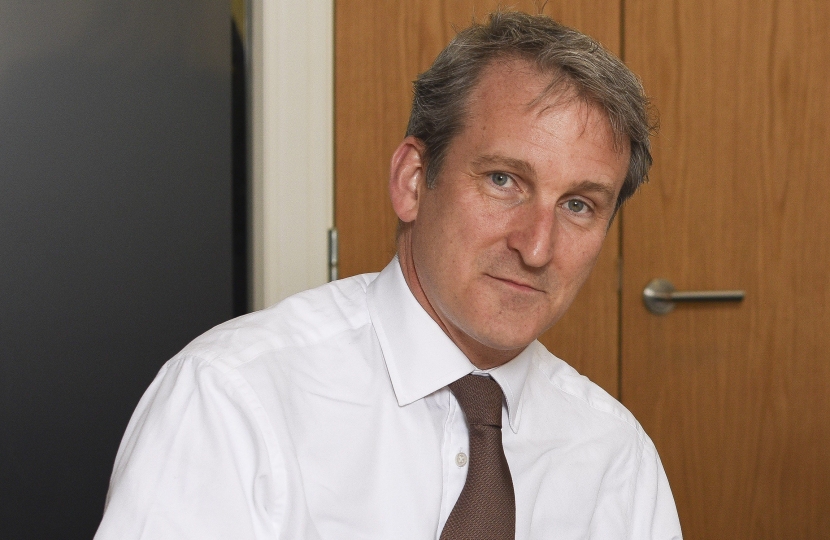
Below is a statement by Damian on the latest position in the Brexit negotiations:
"At the start of the withdrawal process, the EU stated that there were two available options: a ‘Norway’ model or a ‘Canada’ model. Neither of these was optimal and the Prime Minister was clear that, with a nation of our size and international role, and with the proximity we have to the EU, we needed a bespoke British model. Over an extended time, Britain’s negotiating team crafted this and negotiated it with the EU.
"The package includes the key positive features of a customs union, but also allows new international trade deals to be struck; it allows for no tariffs or quantitative checks; it stops large sums of money being due to the EU indefinitely; it gets us out of the Common Agricultural Policy (CAP) and Common Fisheries Policy (CFP); it ends free movement to allow us to set our own skills-based immigration policy; it maintains key partnerships with the EU on a range of shared interests from internal and external security to education and research.
"In short, it is a very compelling, balanced deal, which honours absolutely the outcome of the referendum, is good for key industries, trade and the economy; it can appeal both to those who voted Leave and those who voted Remain.
"The deal - and any negotiated exit deal - involves a ‘withdrawal agreement’, including an Implementation Period, during which the detail of the future relationship would be completed. This eases the transition and means business only has to face one set of changes. The withdrawal agreement also includes the Northern Ireland Protocol, the so-called backstop, which manifests our commitment to the people of Northern Ireland from the Good Friday agreement that there will be no return to a hard border on the island of Ireland. It is not intended that the backstop would actually need to be used - it is an insurance fall-back in case other arrangements that would prevent a hard border were not yet ready.
"However, were we ever to be in the backstop, a number of advantages would come with it - we would be out of the CAP and CFP, have tariff-free access to the EU markets but without our current contributions to the EU being payable by the UK, and we would not be subject to the rules on free movement of people; the downsides would be that although we could negotiate new trade deals, we would not be able to enact them until the backstop period was over, and some limited checks (carried out by UK officials) would be needed on goods travelling east to west (and not the other way around) from Great Britain to Northern Ireland.
"It is a good deal and I have consistently supported it and voted for it, so we could exit the EU on time, on Friday 29th March, in a way which would be good for people’s jobs and livelihoods.
"Unfortunately, however, it has not been possible to secure a majority in Parliament for this deal. (Nor, as we have seen, has it has been possible to secure a majority for any other approach, based on initiatives proposed by MPs from all parties.)
"Those opposing the deal have done so for a wide variety of reasons, some of them conflicting or mutually exclusive: to force a general election, to make Scottish independence more likely, because some do not want to leave the European Union at all or because they want a second referendum, because it was not ‘pure’ enough for those who wanted to leave with no deal at all, and various other reasons both party political and other.
"Recently we have had a process in Parliament where different groups of MPs were able to put forward different options. ALL of these (except no deal) require the withdrawal agreement. None secured a simple majority in Parliament, though it may be that through further rounds, a majority might be possible.
"We had a deadline of 11pm on Friday 29th March for Parliament to pass the withdrawal agreement in order for the EU to agree an extension of the Article 50 process to 22nd May. This would have allowed time to pass the required legislation but would have avoided the need to take part in European Parliament elections. Labour has not objected to the withdrawal agreement (their arguments are over the future relationship), but voted against it anyway.
"We did not pass the withdrawal agreement on Friday 29th March, which leaves us with the default of leaving without a deal on 12th April, but Parliament has said clearly it will not support leaving without a deal.
"It is not in the UK's gift now to specify that we will extend the Article 50 process beyond 12th April, nor to specify the length of any such extension - since we did not reach agreement by the 29th March deadline, those are now matters on which we must apply to the EU – which the Prime Minister has done - and will require unanimity of the 27 nations.
"We have, of course, had discussions with MPs from across the House of Commons already, but I do hope that the discussions now, given the imperative and timing, will be constructive, positive and productive."
The imperative is to find a way forward that both commands a majority in our own parliament and is negotiable with the EU. And it must be a way forward that honours the outcome of the 2016 referendum. I will continue to work for that.

